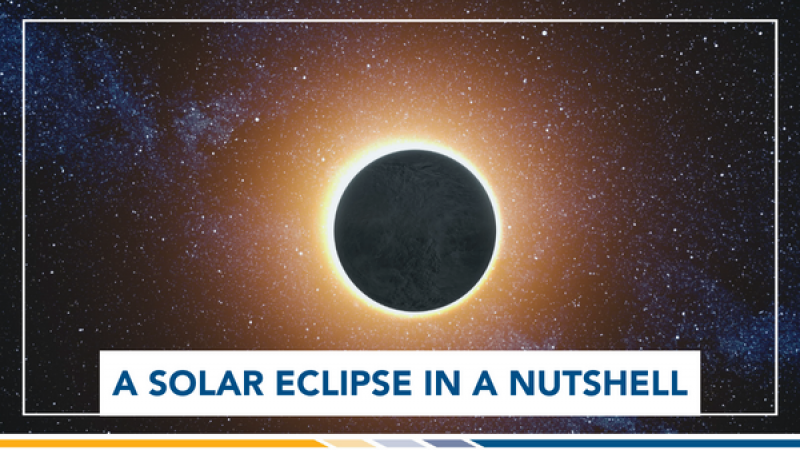A Solar Eclipse in a Nutshell

Find a picture on the wall in your house, preferably of a person’s face. Maybe the newborn picture your parents will never take down. Stand a few feet back and give it a big thumbs up. Now, extend your arm all the way and center your thumb right over the face in the picture. You’ll need to make sure one eye is shut as well. Your thumb doesn’t quite cover the face, does it?
Carefully step backward and do so until your thumb covers the face perfectly. You have just modeled a solar eclipse! How, you ask? I bet you could get there on your own, but since this is a written article, I’ll give you all the answers straight up.
Your thumb represents the moon. The face in the picture is the Sun, which you definitely should NOT stare at before the actual eclipse, by the way. Your eye is the Earth. At the end of the simple, yet intentional process above, the moon fully and exactly covered the Sun in the sky. That’s what a solar eclipse does; that’s what all the fuss is about.
But it’s a worthy amount of fuss - I promise.
Think about the design the Lord God had to place into our solar system to make an eclipse happen, and it’s even more complex than our simple demonstration.
First, your arm is a certain length, as the moon is a certain distance from the Earth. After you found the eclipse with your thumb, if you had moved your thumb in or out - no more eclipse. That would mean no total solar eclipses if the moon was just a little closer or further away!
Next, the distance from your eye to the picture. You had to look carefully and move back slowly enough to ensure your thumb perfectly covered the picture. So, if the moon’s distance is set, and the Earth was any closer to or further from the Sun - no total solar eclipse!
Also, your thumb could have been lower and higher than the picture. The moon could pass “above” and “below” our viewpoint to the Sun. In scientific speak, the moon’s orbit doesn’t have to be in the same plane as the Earth’s orbit around the Sun. It is, though (give or take), so we can see a total solar eclipse every now and then as a result.
Lastly, at the distance you’ve walked from the picture, combined with the length of your arm, another finger won’t work. Try it with your pointer. Your thumb is all that works! Of course, that makes sense since we designed it that way. So, even if the moon was at the right spot, it may have been too small or too big for an eclipse. For the moon to take up the same amount of space in the sky as the sun, the size ratio must equal the distance ratio. So, according to one website: “the Sun is roughly 400 times larger than the Moon. But the Sun also happens to be 400 times further away than the Moon, and this has created an amazing coincidence.” Coincidence? Yeah right!
God ordains all things that come to pass. He is sovereign to provide us with amazing events that people all over the country will travel to see, especially since the next eclipse in the United States (on April 8, 2024) won’t happen until 2044. He is also sovereign over the small, seemingly insignificant events that occur in your life every day. If God is powerful enough to perfectly order the Sun, moon, and Earth to make an eclipse happen, He is certainly to be trusted with the particulars of what you’re going through right now.
So, grab some eclipse glasses, drive if you have the opportunity to, budget time for some AVRs from classes on April 8, and make it happen. God is putting on a show that day. Seeing that show will help you better appreciate the show He puts on every day!
__
Veritas Scholars Academy teacher Kyle Klunick has taught Physics, Math, Chemistry, and all sorts of middle school science topics. He serves at Exodus Church by helping to lead worship. When he isn’t practicing new songs or planning lessons, he’s reading books he should have read a long time ago or acquiring firewood for the winter. He and his wife, Chelsea, are told almost daily that they must have their hands full raising their three children (including twins). They are blessed to homeschool all three of their children.
If you are a student or parent considering science classes for the upcoming year, we discuss planets and the solar system in Earth Science, General Science, and Physical Science at VSA!






